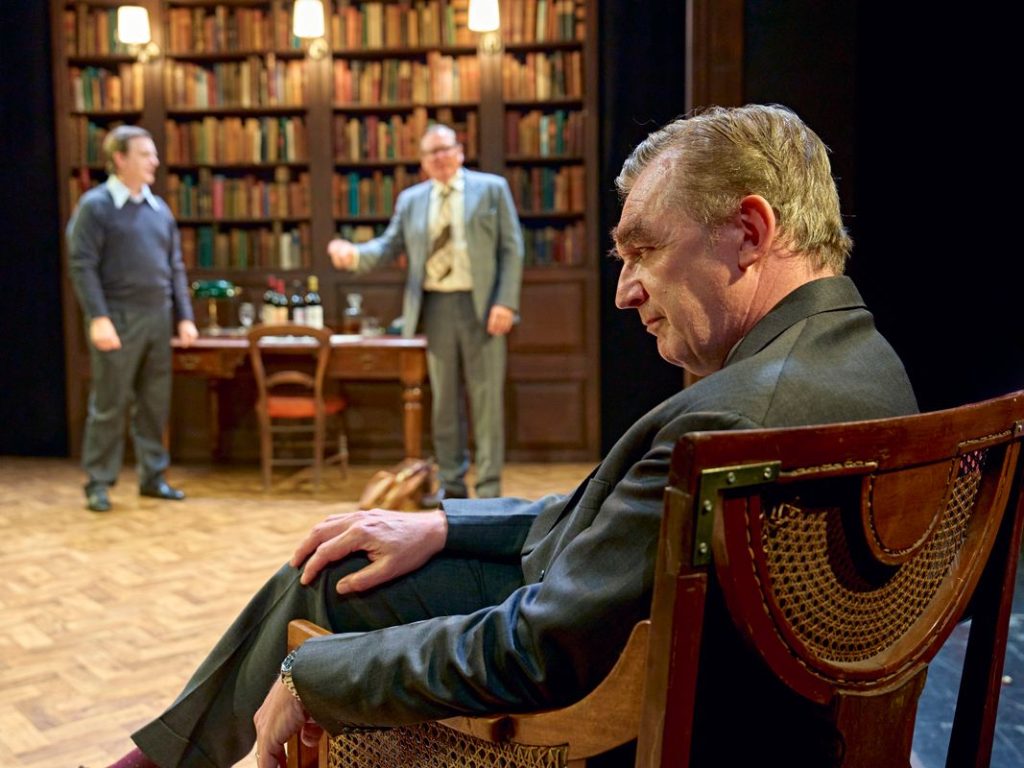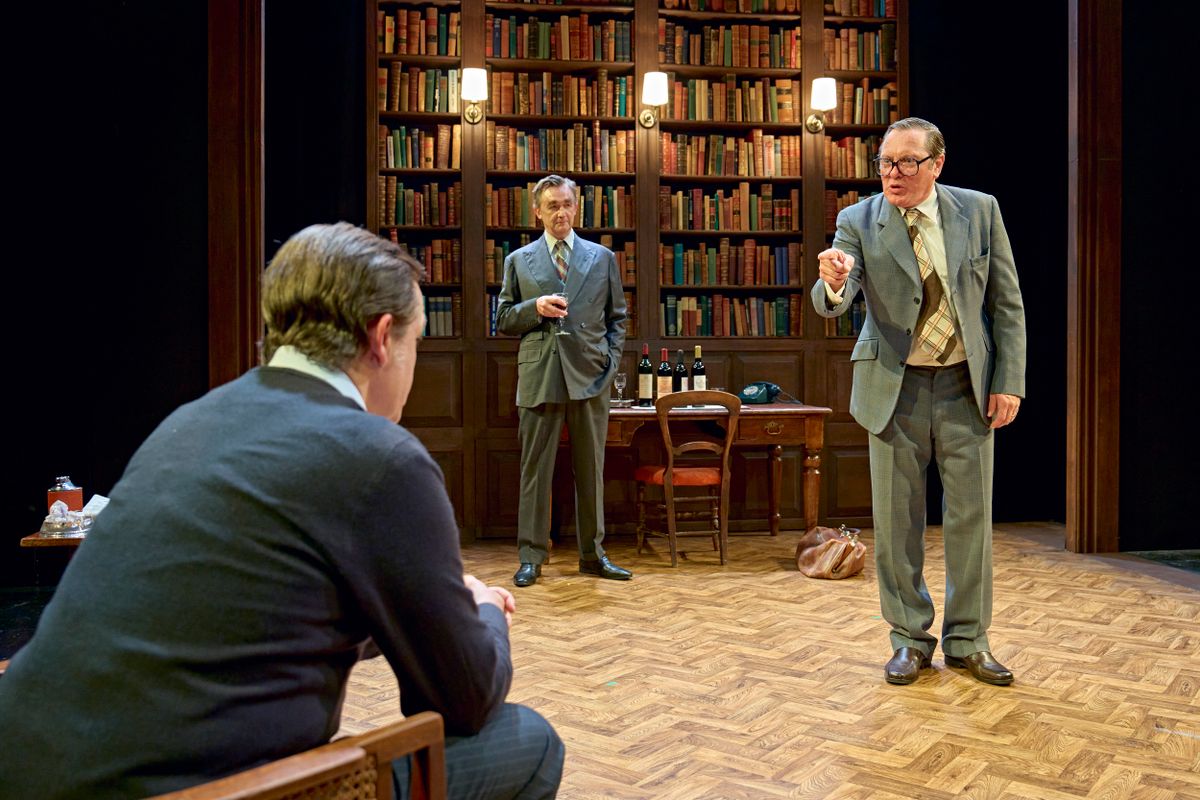A heavy desk, rows of well thumbed Hansard volumes and the tell tale scent of pipe smoke set the scene of this 1970s political play. Robert Khan and Tom Salinsky unravel their ninety minute political comedy drama The Gang of Three with disarming ease, inviting you to eavesdrop on a trio of Labour heavyweights who believe leadership is their birthright. Roy Jenkins, Denis Healey and Tony Crosland spar, reminisce and scheme as Harold Wilson’s shock resignation looms, each convinced the crown will soon rest on his own greying head. The stakes are high but the mood stays deliciously barbed, like an episode of Yes Minister that suddenly grows teeth.
Rather than dumping a block of exposition, the writers lace a discreet plotline through three pivotal meetings. First you find the men in 1972 vying for the party deputy role, then in 1976 grappling with Wilson’s departure, and finally a brief flashback to wartime Oxford that shows how long buried loyalties and rivalries formed. These revelations arrive almost mid sentence, so the story drips through the dialogue rather than stopping it. You learn that only Jenkins champions Europe outright, that Healey guards the public purse with bullish pride, and that Crosland’s suave charm hides a longing for approval. By the time Jenkins starts planning create the future Social Democratic Party and split Labour, you understand why history is about to swerve away from their grasp.
Hywel Morgan gives Roy Jenkins a pin sharp authority that threatens to buckle whenever ambition outpaces confidence. He rolls each syllable around his tongue like a club port, showing the man’s cultivated polish without letting you forget the grammar school drive that powers him. Colin Tierney’s Dennis Healey barrels in with raucous wit and those famously unruly eyebrows, yet inserts sudden stillness whenever real danger surfaces. Alan Cox steals more than one exchange as Tony Crosland, a silk lined grenade of intellect, insecurity and mischief. He flirts, cajoles and needles in the space of a heartbeat, hinting at past intimacy with Jenkins, then blowing it apart with a single clipped joke. All three actors nail the rhythms of men who have rehearsed their arguments for decades, listening only long enough to reload a counter jab. Even when the script dips into niche Westminster jargon the performances keep the stakes personal and accessible.

Director Kirsty Patrick Ward keeps the room humming. She favours swift blackouts and sharp lighting shifts that mimic the flash of a camera bulb, propelling you from one year to another without fuss. The blocking is deceptively simple. Characters circle the desk as if orbiting power itself, changing sides whenever alliances shift. A single gesture, Crosland adjusting Jenkins’s tie in that Oxford flashback, lands like an electric jolt precisely because everything else is so contained. Dominic Brennan’s sound design drops in clipped BBC news reports between scenes, a neat reminder that the outside world is already judging their every calculation. Jamie Platt’s lighting picks out corners of the study or silhouette a looming bookcase to create the illusion of multiple locations.
Libby Watson’s set and costumes immerse you in late nineteen seventies austerity chic. Walnut panelling, green banker’s lamps and a drinks trolley stocked with imaginary claret suggest privilege tinged with anxiety. The suits feel a touch threadbare, ties loosen as the evening wears on, and Healey’s cardigan looks one wash away from surrender. Small props do large narrative work. Jenkins’s trusty Gladstone bag signifies tradition but also conceals the metaphorical wine that makes him reckless. A sheaf of budget papers in Healey’s fist is waved like a cudgel, reminding everyone that he, not Jenkins, signed the cheques that kept the party solvent. These details accumulate until you feel the entire 1970s political establishment compressed into one creaking floorboard.
Where the play really earns its keep is in reflecting our present moment back at us. The writers never essay a sermon, yet every joke about Europe, about factions further left than Benn, about the seductive danger of a new centrist movement, lands with current resonance. When Crosland complains that voters “care more about personality than policy” the audience laughs in a way that suggests the line was written yesterday.
So what lingers? Pride, mostly. The pride that stops talented people from compromising in time, the pride that persuades a party to punch itself senseless rather than risk looking small. It is tragic in miniature, a politely upholstered Greek myth. Yet it is also uproariously funny. The script lands one perfectly aimed joke after another, and the trio deliver them with relish yet never forget they are playing real men. At one point Healey growls that he is “not in politics for the jokes,” only to crack the loudest laugh line minutes later. That contradiction sums up the night: serious intent, foolish execution, humanity slipping through every crack.
The Gang of Three is a modestly scaled production that punches above its weight. It distils a complicated decade into an evening of entertainment and leaves you smarter than when you arrived. In the cosy intimacy of the King’s Head, you are let backstage at a moment when history could have tipped another way. The play’s final image, three men frozen in sudden disbelief as their future evaporates, is simple and oddly moving. You leave thinking about squandered chances, about power found and lost, and about how much of the country still lives in the shadow of that alcohol fuelled night in 1976.


